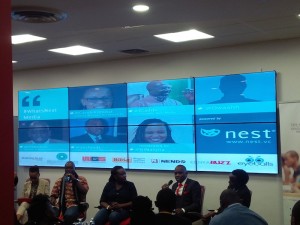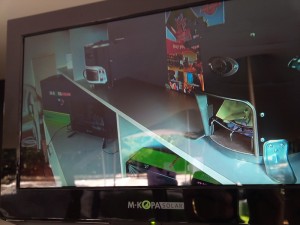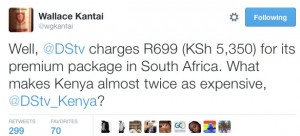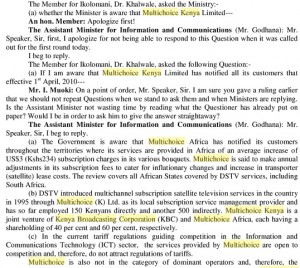Acumen: regional fellows program is a one-year, fully funded leadership development program designed to equip East Africa, India and Pakistan’s next generation of social leaders with the tools needed to unlock their full potential and drive positive change. Applications for East Africa close on July 27.
Africa Business Fellowship: will match young American business professionals with paid 6-month placements in African companies.
African Fact-Checking Awards: organized by Africa Check and the AFP Foundation, these are the only awards that honour journalism by media based in Africa that expose misleading claims made by public figures and institutions. Eligible entries must be original pieces of fact-checking journalism first published or broadcast between 1 September 2014 and 31 August 2015, by a media house based in Africa – in print or online, broadcast on the radio or television or published in a blog. Winner will receive a cash prize of €2000 and the two runners-up a prize of €1000 each.
Africa Leadership Network: apply to join hundreds of Africa’s most influential leaders at the sixth annual ALN gathering which will be held in Morocco from November 3 to 7, 2015. . Early bird discounts are offered, and for the first time, select non-ALN members will be eligible to attend #ALN2015.
Ampion: Venture Bus Africa Incubation Road Trip is a 7-day road trip across the continent that aims to take up to 200 participants on five buses in Morocco, Tunisia and Western, Eastern Africa and Southern Africa regions. Apply now for the East Africa group which has e-health, and governance themes for a trip planned 22 – 28 Oct. 2015.
Aspiring Entrepreneurs Program: targets 30 promising and aspiring entrepreneurs between ages 18 – 35 to join the program, in which they will get the opportunity to start their own business with grants approaching one million Naira (~$5,025). Apply by 30 July.
BAKE/ Mzalendo: Political blogging workshop aims to help bloggers improve their writing or blogging skills on any of the following topics: parliamentary business, devolution and county Assemblies work, data journalism and constitutional Implementation? There are 30 slots, and the deadline is 19 July.
Bloomberg Media Initiative Africa: (BMIA) is a prestigious pan-African executive training program that’s been developed for mid-career journalists, financial professionals with an interest in financial journalism; government professionals, development practitioners and civil society professionals. Apply for the this fully funded, free program worth $15,000 for sessions at leading universities in South Africa, Nigeria and Kenya.
British Institute in Eastern Africa: (BIEA) has research funding for projects in the areas of spending time, everyday states, connections & disconnections, bio-cultural frontiers, and land, heritage & memory. Deadline is 1 August.
Commonwealth Writers: call for writers is seeking commission correspondents in the different regions of the Commonwealth and also writers for longer pieces. Dealing is July 27.
Eisenhower Fellowships: seeks a diverse mix of applicants from Ghana, Kenya, Nigeria, Rwanda, South Africa, Tanzania, Zimbabwe in a wide range of professional sectors to tackle big challenges in the future. Deadline is October 16.
Traveling to Kenya? From 1 September all visitor visas will be applied for online at an eCitizen website with payments made via debit or credit card and a 2 (working) day processing time.
A Kiswahili Kshs 1 million (~$10,000) literary award is the Tuzo ya Fasihi ya Ubunifu Kiswahili Literary Award which will see will see winners eligible to win up to Kshs 1,000,000 and be published in Kenya by Spotlight Publishers and translated in France. Submit manuscripts of novels written in Kiswahili by 15 September.
Making All Voices Count: (MAVC) has grant funding for practitioner research & learning (up to £25,000 for projects, of a minimum of 3 – 12 months) and for research (up to £75,000 for research projects of 3 – 18 months)
– Also, there’s a MAVC #Tech4CitizenVoice competition in South Africa to find local innovators with early-stage tech governance projects that the programme could potentially incubate and fund. Deadline is 10 August.
The Mobile Application Challenge: (MAC) has an African Tech Challenge that comes with a $5,000 first prize (plus free access to Gearbox incubator for 6-months), $2,000 for second and $1,000 for third place during which the final 10 contestants will have the opportunity to build the mobile app and demo the results in front of a judging panel. Apply by the 18 July deadline. The aim is to help Kenyan youth get technical skills in manufacturing that will help them in future to engage in entrepreneurship and in getting quality jobs. This year, there are two competitions (Technical Challenge and Mobile App Challenge) with cash prizes amounting to $10,000 for the Technical Challenge’s top six teams and $8,000 as a cash prize for the top three individual winners of the Mobile App Challenge.
Rhodes: scholarships fully fund and support post-graduate study at Oxford University for scholars from 32 counties, with 2 places for Kenyans in 2016. Application deadline is 31 August.
World Bank: Young Professionals Program has been the preeminent program preparing global development leaders. The application for the 2016 group runs through July 31, 2015. The World Bank also has an ongoing recruitment drive for African nationals that aims to increase the number of Sub Saharan Africans in its workforce. The application deadline is August 31.
YALI East Africa: apply to join the YALI regional leadership center East Africa, which is based in Nairobi and has three program tracks; business & entrepreneurship, civic leadership, and public management with a note that applicants from Eritrea can only join either the business & entrepreneurship or the civil leadership ones and applicants from Sudan can only join the civic leadership one.
EDIT
AfricaKnows monthly photo competition is back, with the theme is ”Highways and Road Infrastructure”. Submit your best images that showcase highway construction projects and other road infrastructure for a chance to win cash prizes.
Apply for the Ambassadors to the Internet Governance Forum (João Pessoa, Brazil) as either a First-Time or as a Returning Ambassador. IGF Ambassadorships are for young Internet Society members who have a strong interest in the issues and themes of the IGF. Applications close on August 2.
Glaxo Smith Kline and Save the Children have launched their 3rd annual $1 million Healthcare Innovation Award which awards healthcare innovations that have helped reduce child deaths in developing countries. Apply online by September 7.
Graduate trainee at Mabati Rolling Mills can build personal skills and experience in specific functions in preparation for growth into a senior role at the Safal Group in the next five years. Apply by 17 July.
Safaricom have launched the 3rd edition for the Safaricom Appwiz Challenge, a 3-month developer challenge targeting Kenyan innovators in mobile ICT. Since its introductions in 2013, and has since incubated close to 30 tech start-up solutions including Safaricom M-Ledger and Magazine Reel, both of which are now commercially successful and sustainable businesses. The Grand Winner will receive a cash grant of Ksh1.5 million (~$15,000), while the 1st Runner-up and 2nd Runner-up will receive Kshs.1million and Kshs. 500,000 respectively. The submission period kicks off on 20th July 2015 and closes on 16th August 2015.
Orange have launched the 2015 Orange African Social Venture Prize now in its 5th edition to encourage innovative start-up projects that help accelerate development in Africa. The prize awards three projects with grants of 10,000, 15,000 and 25,000 Euros, along with six months of mentorship from Orange, and the first prize will also receive free patent registration in the country of the project’s deployment. Deadline is September 18.
EDIT II
The 5th edition of the CIO100 have been launched and they enable corporate organizations (both MNC’s and SME’s) to nominate and share the various technology innovations that have enabled them to enhance their operations. Deadline is September 30.
International Women’s Media Foundation (IWMF) African Great Lakes Reporting Initiative will enable six (6) women journalists to travel to the Central African Republic and report on civil society, governance and humanitarian issues. Deadline is August 12
Graça Machel Scholarships for Women is open to nationals and residents in any of the SADC countries: Angola, Botswana, DRC, Lesotho, Madagascar, Malawi, Mauritius, Mozambique, Namibia, South Africa, Swaziland, Tanzania, Zambia, Zimbabwe – who have good first degrees and are studying or applying to study at a South African university.
The second round of the Safaricom Business Journalism Fellowship (SBJF) Program is now open to full-time editorial employees of newspapers, magazines and broadcast news organisations and freelance journalists who have at least four years’ experience. There are 15 places this year for the eight month, mid-career program that gives business journalists the opportunity to train alongside Kenya’s leading business lecturers and some of the top leading newsmakers in the region.
The International Reporting Project (IRP) has a group reporting trip to Ecuador focusing on health and development issues on October 18-29, 2015. Apply by August 7.
EDIT III
African Business Awards aim to recognize individuals and companies driving the continent’s rapidly evolving economy forward. Categories being competed for are (i) African business of the year (ii) business leader of the year (iii) outstanding woman in business (iv) award for good corporate governance (v) award for best corporate social responsibility (vi) award for innovation (vii) insurance company & initiative of the year (viii) African business icon and (ix) lifetime achievement award. Deadline is August 10
African Media Initiative media competition is open to professional journalists and media organizations can apply. The Zimeo excellence in media awards are in gender reporting, youth reporting, maritime economy reporting, business and finance reporting, technology reporting, agriculture and food security reporting, health reporting, education reporting, peace and security reporting, energy reporting, data journalism and climate change reporting. Deadline is Aug. 31.
EDIT IV
Centum Foundation is an initiative is to fund a crop of promising businesses, and within a year, to turn businesses to a sustainable and successful enterprise.
Disruption By Design Awards 2015 – DXD 2015, is a platform that recognizes and awards local changemakers and innovators. Details here and the deadline is August 28.
Airtel and Samsung, have partnered to search for the next big app developer from the continent. Deadline for applications is 5 September 2015.
Diplo and the NEPAD Agency invite applications for an 11-week long online training course Internet Governance in Africa which starts on 14 September 2015 and covers fundamental aspects of Internet governance and Internet policy. Applications should be received by 15 August.
Knight-Mozilla Fellowships 2016 present a unique opportunity for people who love to code and who want to influence the future of journalism on the web. Deadline is August 21.
M-PESA Foundation Academy has started the formal applications process for bright, talented but economically disadvantaged students in all 47 counties, from which 2 students per county will join the inaugural class starting in January 2016,.
Hadithi is the Airtel blog that allows people to share exciting ideas and stories on innovative people and out of the box concepts and are seeking people to submit their content for Airtel to publish by sharing their contact details, rate card and at least 3 writing samples.
Jumia Kenya wants to pay you to post status updates on Facebook, Twitter and other sites in Kenya. Launched in January 2015 the Jumia affiliate program has become a cash cow for the social media lovers. Commissions vary depending on the different categories of products one chooses to promote but to a maximum of 11%.
Mining 4 1 is a call for innovations on technology in the Kenya mining sector. The top five innovators will be given a chance to present their ideas before a panel of leading entrepreneurs, industrialists and senior executives from the mining industry at the upcoming ‘Mining 4 I‘ event to be held at the Strathmore Business School. Applications deadline is 20 August.
What other opportunities are there for readers to apply for?





